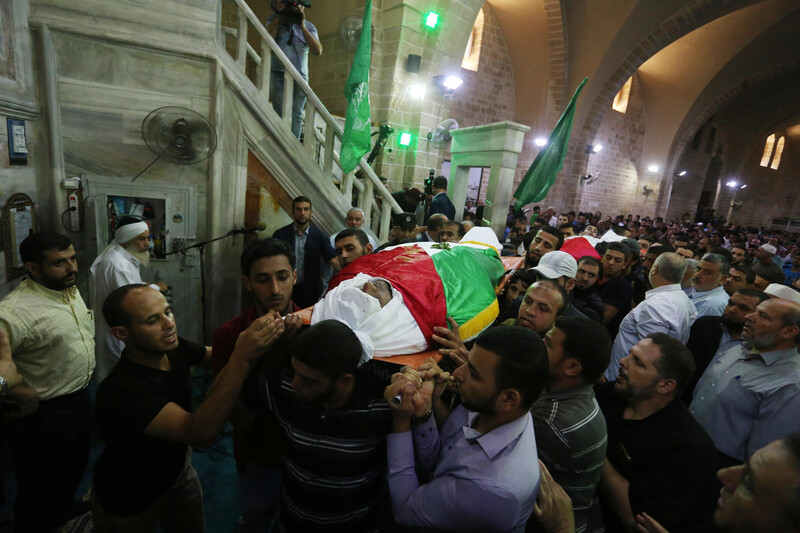The Electronic Intifada 14 October 2019

The funeral of Gaza police officers Alaa al-Gharabli and Salameh al-Nadim.
APA imagesMuhammad Jarada was walking home from work when he saw a man hop off his motorbike and hug a police officer.
A moment later, Jarada was knocked down by the force of an explosion; everything seemed to go completely dark.
“When I realized what had happened, I saw there were bodies of police officers on the ground,” Jarada, a carpenter, said. “I ran to my house immediately.”
The incident occurred on the evening of 28 August.
The man on the motorbike has subsequently been named as Abdulaziz al-Hajjaj, aged 26. He blew himself up after embracing Alaa al-Gharabli, a 32-year-old police officer then staffing a checkpoint at al-Dahdouh crossroads in the Tel al-Hawa area of Gaza City.
Alaa leaves behind two children: Yousif, 4, and Ahed, 2.
“Every morning, Yousif and Ahed ask me when their dad will come home,” said Alaa’s father Ziad. “Sometimes I tell them soon and sometimes I just stay silent.”
History of pain
The family has lost members due to violence in the past.
Alaa’s brother Bahaa was killed during Operation Cast Lead, a major Israeli offensive almost 11 years ago. Also a police officer, Bahaa was killed when Israel attacked a police station on 27 December 2018, the first day of its offensive.
Another brother, Ahed, was killed during Israel’s 2014 attack on Gaza. A medic, Ahed was trying to aid people wounded by Israel in al-Shujaiyeh marketplace of Gaza City when he was shelled by the Israeli military.
Alaa’s brothers did not know their killers personally.
Alaa, however, was blown up by one of his neighbors. Abdulaziz al-Hajjaj lived only 700 meters from his home in al-Shujaiyeh.
It would not have been unusual for him to greet Alaa with a hug.
Another police officer was killed alongside Alaa. He has been named as Salameh al-Nadim, also aged 32.
Abdulaziz al-Hajjaj had been suspected by the Gaza authorities of supporting Islamic State. He had been detained earlier this year for making explosive material but was released following a short period, according to Gaza’s interior ministry.
The attack he carried out was one of two suicide bombings on 28 August.
The second took place less than an hour later.
“Great chaos”
Abdulkarim Abu Ras was selling coffee from his stall in the Sheikh Ajleen area of Gaza City when he saw an officer at a police checkpoint being approached by another man.
“Suddenly, there was a big explosion,” said Abu Ras. “I saw body parts flying in the air.”
Abu Ras had worked near Wael Khalifa, the police officer who was killed, for the previous five years. “He was a very kind person – always smiling,” Abu Ras said.
Aged 43, Wael had three children: Zain, Adam and Muhammad. He had celebrated the first birthday of Muhammad, his youngest son, a week earlier.
“We spent a great day together and Wael was very happy,” said his wife Sumaya Younis. “I never thought it would be one of our last times together.”
Like Muhammad, his 5-year-old brother Zain is too young to understand that his father was killed.
“Every morning Zain waits for his father to take him to the kindergarten by motorbike,” Sumaya said. “He hasn’t realized yet that he has lost his father.”
Wael’s killer has been named as Muhammad al-Basous, aged 27.
The Gaza authorities had previously detained al-Basous for 14 months on charges that he had been involved in making bombs for Islamic State. He had been released earlier this year, according to Gaza’s interior ministry.
Following his release, al-Basous rejected Islamic State’s ideology in a statement, a source in the interior ministry said. The bombing he carried out suggests that his rejection was not genuine.
Islamic State’s branch in the Sinai – a region of Egypt that borders Gaza – reportedly declared war on Hamas last year. A video attributed to Islamic State accused Hamas, which oversees Gaza’s administration, of apostasy because it has participated in elections.
Eyad al-Buzom, a spokesperson for Gaza’s interior ministry, said that some arrests have been made since the bombings occurred in August.
The authorities are investigating the likelihood that Islamic State has recruited a group in Gaza via the Internet. The sources of funding to the group are also being probed.
One theory being examined is that a third suicide bombing had been planned for the same evening. The man suspected of preparing that attack was arrested before he could execute his plans.
According to al-Buzom, the intention of the group recruited by Islamic State was “to cause great chaos in the Gaza Strip.”
Hamza Abu Eltarabesh is a journalist from Gaza.





